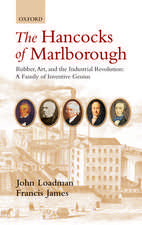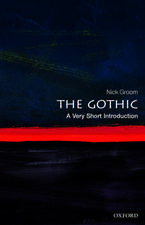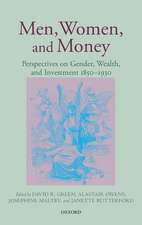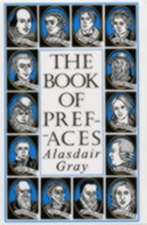Sex, Religion, and the Making of Modern Madness: The Eberbach Asylum and German Society, 1815-1849
Autor Ann Goldbergen Limba Engleză Paperback – 15 mar 2001
| Toate formatele și edițiile | Preț | Express |
|---|---|---|
| Paperback (1) | 472.51 lei 31-37 zile | |
| Oxford University Press – 15 mar 2001 | 472.51 lei 31-37 zile | |
| Hardback (1) | 621.17 lei 31-37 zile | |
| Oxford University Press – 29 iul 1999 | 621.17 lei 31-37 zile |
Preț: 472.51 lei
Preț vechi: 550.45 lei
-14% Nou
Puncte Express: 709
Preț estimativ în valută:
90.43€ • 94.06$ • 74.65£
90.43€ • 94.06$ • 74.65£
Carte tipărită la comandă
Livrare economică 04-10 aprilie
Preluare comenzi: 021 569.72.76
Specificații
ISBN-13: 9780195140521
ISBN-10: 0195140524
Pagini: 252
Ilustrații: 4 halftones, 1 map
Dimensiuni: 150 x 226 x 23 mm
Greutate: 0.37 kg
Ediția:Revised
Editura: Oxford University Press
Colecția OUP USA
Locul publicării:New York, United States
ISBN-10: 0195140524
Pagini: 252
Ilustrații: 4 halftones, 1 map
Dimensiuni: 150 x 226 x 23 mm
Greutate: 0.37 kg
Ediția:Revised
Editura: Oxford University Press
Colecția OUP USA
Locul publicării:New York, United States
Recenzii
Goldberg's excellent study ... raises many fruitful questions for future research. It demonstrates well how sensitive, deep reading of local sources can deepen our understanding of large-scale social, intellectual and institutional transformations.
Goldberg is equally good at showing how patients tried to overcome the immense power gradient between them and the doctors, and how their efforts so often succeeded only in confirming a diagnosis of insanity.
One of Goldberg's most important accomplishments is to restore religion to its central place in the development of modern insanity.
Ann Goldberg has written an excellent social histor of madness in the first decades of the modern insane asylum ... a sensitive micro-study.
"Goldberg's rigorous, penetrating, and suggestive investigation of social values and the development of psychiatric practices in Vormaerz Germany offers more than just fascinating glimpses of life in and around a typical asylum....Lucid text, detailed citations, and comprehensive bibliography. Highly recommended."--Choice
"Goldberg's remarkable study of mental illness in early nineteenth-century Germany places the phenomenon of insanity squarely within the context of a late absolutist regime and a crisis-ridden, impoverished social and economic order. Her account of the gendered structuring of madness, its bureaucratic politics, and its connections to religious enthusiasm and religious prejudice offers an unexpected but extraordinarily illuminating insight into state and society in Germany before the revolution of 1848."--Jonathan Sperber, University of Missouri
"Goldberg's enterprise is an original and long-missed contribution to the social and cultural history of madness in the first half of the nineteenth century. Her work provides at the same time valuable insights into the broader field of the history of peasant culture and social experience, especially in the rural world of Nassau. The strength of Goldberg's work is an outstanding and sensitive interpretation of the individual's experience of madness as a language of distress and dissent in rural lower-class culture that was shaped by gender and ethnicity."--Doris Kaufmann, Max Planck Institute for the History of Science, Berlin
"Ann Goldberg's new book opens a challenging new dimension of nineteenth-century German social history. We've had histories of asylums and medicalization in other national fields for some years, likewise a profusion of works on the formation of Germany's bourgeois culture. There is even the kernel of a literature on early nineteenth-century German rural society. Now Goldberg has beautifully brought together these concerns. This fascinating exploration of sexualities, religion, and the modern pedagogies of order takes us to the frontier of bourgeois culture and rural society, where ordinary people learned how to be ill. This is a 'micro' history that compels the 'macro' to listen."--Geoff Eley, The University of Michigan
Goldberg is equally good at showing how patients tried to overcome the immense power gradient between them and the doctors, and how their efforts so often succeeded only in confirming a diagnosis of insanity.
One of Goldberg's most important accomplishments is to restore religion to its central place in the development of modern insanity.
Ann Goldberg has written an excellent social histor of madness in the first decades of the modern insane asylum ... a sensitive micro-study.
"Goldberg's rigorous, penetrating, and suggestive investigation of social values and the development of psychiatric practices in Vormaerz Germany offers more than just fascinating glimpses of life in and around a typical asylum....Lucid text, detailed citations, and comprehensive bibliography. Highly recommended."--Choice
"Goldberg's remarkable study of mental illness in early nineteenth-century Germany places the phenomenon of insanity squarely within the context of a late absolutist regime and a crisis-ridden, impoverished social and economic order. Her account of the gendered structuring of madness, its bureaucratic politics, and its connections to religious enthusiasm and religious prejudice offers an unexpected but extraordinarily illuminating insight into state and society in Germany before the revolution of 1848."--Jonathan Sperber, University of Missouri
"Goldberg's enterprise is an original and long-missed contribution to the social and cultural history of madness in the first half of the nineteenth century. Her work provides at the same time valuable insights into the broader field of the history of peasant culture and social experience, especially in the rural world of Nassau. The strength of Goldberg's work is an outstanding and sensitive interpretation of the individual's experience of madness as a language of distress and dissent in rural lower-class culture that was shaped by gender and ethnicity."--Doris Kaufmann, Max Planck Institute for the History of Science, Berlin
"Ann Goldberg's new book opens a challenging new dimension of nineteenth-century German social history. We've had histories of asylums and medicalization in other national fields for some years, likewise a profusion of works on the formation of Germany's bourgeois culture. There is even the kernel of a literature on early nineteenth-century German rural society. Now Goldberg has beautifully brought together these concerns. This fascinating exploration of sexualities, religion, and the modern pedagogies of order takes us to the frontier of bourgeois culture and rural society, where ordinary people learned how to be ill. This is a 'micro' history that compels the 'macro' to listen."--Geoff Eley, The University of Michigan
Notă biografică
Ann Goldberg is an assistant professor of history at the University of California, Riverside.












